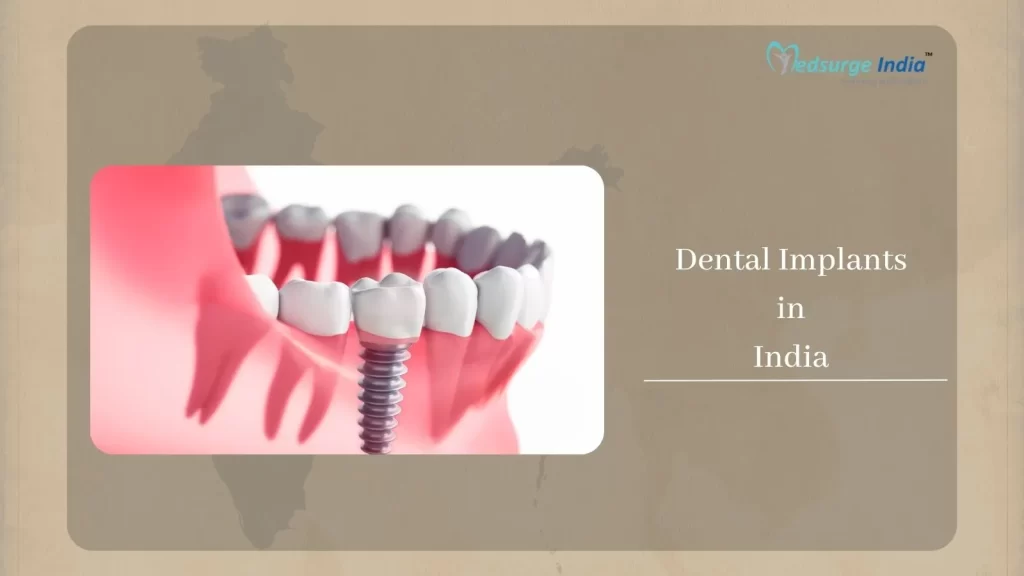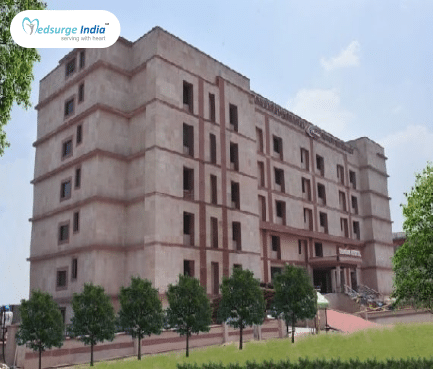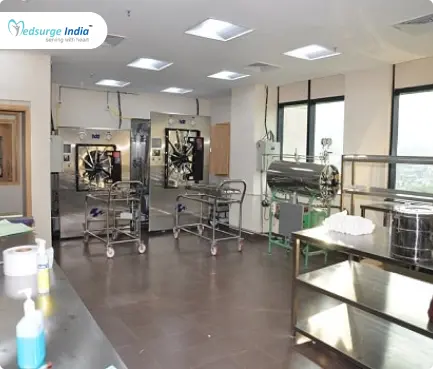
Dental Implants are artificial roots for teeth that are surgically implanted into your jawbone in order to keep the new tooth crown in place. They are an excellent substitute for regular dentures or dental bridges. Metal implants allow you to have a full set of teeth that appear and feel natural.
Dental Implant Surgery in India is performed depending on the type of implant chosen by the doctor and the condition of your jawbone. The main advantage of implants is that they provide stable support for your new teeth, a process that requires the bone to heal securely around the implant. Because bone regeneration takes time, the process can even take months.
What is Dental Implant
A Dental Implant in India is a small titanium post (screw) that is surgically implanted beneath your gum line within your jawbone. This implant will merge with your jawbone, providing a stable support for your tooth reconstruction. A dental implant post replaces the root of an eliminated tooth. It not only fuses with your bone like a root, but it also assists in preserving the structure of your bone.
A restoration is placed on top of a dental implant post. Usually, a single crown is used to replace a single tooth. Dental implants, on the other hand, can support multiple lost teeth with a bridge and even fix dentures. Dental implants, with proper care, can last a lifetime. Dental implants have a 98% success rate. For this reason, and because of its numerous advantages, dental implants are frequently considered the best option for permanently replacing missing teeth.
How Many Types of Dental Implants are Available in India
There are three different Types of Dental Implants available in India:
1. Endosteal Implants:- The most frequently utilized implant today is an Endosteal Implant in India (root shape implant). It is made with titanium, small screws, and alloplastic material, which is an artificial tissue graft. Endosteal implants in India are placed into the jawbone surgically. The implants connect with the native bone over time. They’re just placeholder posts in the shape of screws. They insert the jaw into which artificial teeth are inserted. It takes some time to heal after the treatment is completed. It takes time for the pieces to come together and become a stronghold. Once healed, artificial teeth can be attached to the post to match the neighboring teeth.
2. Subperiosteal Implants:- Subperiosteal Implants in India are very rare. They are, however, a superior alternative for those who do not have enough natural jawbone to sustain endosteal implants. A subperiosteal implant is a dental implant that is inserted beneath the gums (on or above the jawbone). It is not placed surgically in the jaw. A metal frame with a post connected is placed under the gum. The gum then heals around the frame, securing it. The fake teeth are attached to the gum-derived poles.
This kind of procedure is only utilized if the patient does not have enough jawbone to support an implant or if the patient does not want to undergo extensive oral surgery to add bone to the area.
3. Zygomatic Implants – Zygomatic Implants in India are the rarest type of dental implant readily accessible. It is the most difficult treatment and should only be performed if there is insufficient jawbone for the Endosteal implant. Instead of the jawbone, the implant is placed in the patient’s cheekbone.If complications appear and your jaw is unable to support implants, and a Zygomatic implant cannot be ruled out, your dentist might suggest alternative possibilities.
Other alternate techniques involve:
- Bone Augmentation
- Sinus Lift
- Ridge Expansion
- 3D Imaging
- Immediate Load Dental Implant
- All-on-4 Implant
Dental Implant Cost In India
On Average Dental Implant Cost in India start from INR 70,800 (850 USD). The Cost of Dental Implant Surgery in India varies depending on the following factors:
- The number and type of implants required
- The placement of the implants within the jaw
- Whether any extra procedures to prepare the mouth for surgery are required
During a first evaluation, a dentist or another oral health professional can estimate the Cost of Dental Implant Surgery in India.
Bridges and other tooth replacement options may be less expensive. Bridges, on the other hand, are more difficult to keep clean and frequently require replacement and repair, raising the overall cost. Dental implants may provide long-term benefits if properly cared.
Helpful – All You Need to Know About Tooth Dental Contouring
Get Free Cost Estimation
Procedure
How Does a Dental Implant Structure Work
A dental implant’s body is made up of three parts that serve different purposes:
- The Implant (or screw): It acts as a prosthetic root for the tooth.
- Abutment: It is the post that connects the implant screw to the crown.
- Crown: It is the fake’ tooth that sits atop the abutment. They have the same form and appearance as your natural teeth.
Step-by-Step Dental Implant Procedure
Dental implant procedures are a kind of outpatient surgery. Patients can go home the same day they have surgery.Due to the healing process and the insertion of an artificial tooth (crown), the treatment can take months to complete. Best Dental Surgeon in India who can do dental implant surgery include:
- Maxillofacial and oral surgeons
- Periodontists
- Prosthodontists
Depending on the number of implants required, the surgery is divided into many steps:
- Tooth Removal: The dentist will extract the damaged tooth if it is still in your mouth. If your tooth is already missing, you can skip this step.
- Grafting and Jaw Bone Preparation: Implant surgery patients may have fragile or sensitive jawbones. Bone grafting will be required in this scenario.
It increases the quantity of bone and ensures that the treatment does not fail. Before a dental implant can be implanted, bone grafts must heal for several months.
- Placement of Implant: During the surgery, the oral surgeon cuts the gums and exposes the bone.A periodontist or oral surgeon drills holes into the bone. The implant (a post) is then placed deep into the bone to serve as the tooth’s root.If a front tooth is being restored, the dentist will use a temporary detachable solution to fill the space while the implant heals under the gums. If it is a back tooth, nothing will be placed over it.
- Growth and Healing: After the metal implant is implanted in your jawbone, osseointegration begins. This is the point at which the supporting bone begins to merge with the implant.This process, which might take several months, ensures that the base is strong enough to support an artificial tooth (dental crown).
- Abutment Placement (Preparation of Crown): Following the completion of the healing process, your dentist will place an abutment on top of the implant post.The implant is extended above the soft tissue (gums) by the abutment. This step facilitates the implantation of the dental crown.
- Crown Placement: Your dentist will take new impressions of your mouth once the implant has grown into the bone and is sufficiently solid to support chewing.
In a lab, a dental technician will build a customized dental crown. The dental crown resembles your natural teeth and is secured to the abutment (connection). It becomes the implant’s only visible component.
What are the Benefits of Dental Implantation in India
Dental Implants provide numerous benefits, including:
- The appearance will be improved
- Speech improvement
- Increased comfort
- Easier to eat
- Self-esteem will be improved
- Oral health improvement
- Durability
- Convenience
- Restores chewing ability
- Restores aesthetic appearance
- Helps in preventing jawbone shrinkage due to bone loss
- Keeps the surrounding bone and gums healthy.
- Aids in the stability of neighboring (nearby) teeth; improves quality of life
Dental implants can considerably improve a person’s quality of life and overall health. However, difficulties do emerge from time to time. Complications might emerge quickly after the insertion of dental implants or much afterwards. Some issues lead to implant failure (which is commonly described as implant looseness or loss). If an implant fails, another surgical surgery may be required to repair or replace the implant system.
What are the Side Effects and Complications Associated with Dental Implants
The vast majority of implant procedures are successful. However, there is still the possibility of improper healing. Practice appropriate dental health care at home, including proper eating, brushing, and flossing, to lower this risk. Minor discomfort is to be expected after any dental procedure. Common Side Effects and Complications associated with Dental Implants (that do not endanger the implant) include:
- Swelling of the gums and face
- Bruises on the skin or on the gums
- Minor bruising
- Pain in the area where the implant was placed
More serious complications that can arise following implant placement include:
- Damage to the teeth, gums, and/or blood vessels around you
- Infection at the implant site
- Bleeding for an extended period of time
- Pressure and sinus difficulties (if the implant is placed in your upper jaw)
- Jaw pain and fracture
- Nerve injury can cause tingling in the mouth or lips.
After Care
Usually, pain relievers and antibiotics are administered following surgery. During the healing phase, it is important to eat only soft foods and maintain good oral hygiene. To achieve the best outcomes, limit your consumption of alcohol, caffeine, and tobacco. During the first several months following the surgery, regular check-ups are required. You should also continue to have frequent dental checkups after surgery.
The Most Important Frequently Asked Questions
Q: Are dental implants painful?
A: You will most likely have minor pain following surgery, but over-the-counter pain medicines can assist.After about a week, the soreness should subside. However, it may take up to 6 months for the implant to fully recover.
Q: How long may dental implants be expected to last?
A: If you take care of your replacement tooth and maintain good oral hygiene, it can last between 15 and 25 years, and occasionally even longer. Because of cosmetic concerns, some people have their implants changed sooner.
Q: What causes dental implants to fail?
A: The most prevalent cause of failure is failed osseointegration (the implant has not linked properly with your jawbone). Allergic responses, tissue damage, infections, sinus difficulties, smoking, and body rejection are some of the other causes.
Q: Are dental implants safe?
A: Implant dentistry has been used for over 50 years. When performed appropriately and by the appropriate specialists (e.g., periodontists and oral surgeons), dental implants are a safe and successful tooth replacement treatment option. Most patients who obtain implants have no complications, and the operations have a high success rate.
Q: How common is the failure of dental implants?
A: It is estimated that 5 to 10% of dental implants fail.
Top Hospitals for Dental Implants in India
Top Doctors for Dental Treatment
Dr. Abhishek Ghosh Dastidar
Experience: 10+ years of experience
Rabindranath Tagore Surgical Centre, Hiland Park, Kolkata
Kolkata, India
Dr. Aman Dhillon
Consultant
Experience: 14 years of experience
Fortis Memorial Research Institute, Gurgaon
Gurgaon, India
Dr. Egammai Sethuraman
Consultant
Experience: 14 years of experience
Apollo Proton Cancer Centre, Chennai
Chennai, India
Dr. Amrita Gogia
Consultant
Experience: 11 years of experience
Medanta – The Medicity, Gurgaon
New Delhi, India
Dr. Supriya Nambiar
Senior Consultant
Experience: 10+ years of experience
KMC Hospital, Hampankatta, Mangaluru
Mangaluru, India
Dr. Rajesh Kumar Jha
Senior Consultant
Experience: 12+ years of experience
Rabindranath Tagore Surgical Centre, Hiland Park, Kolkata
Kolkata, India
Dr. Rajni Sharma
Consultant
Experience: 12 years of experience
Fortis Memorial Research Institute, Gurgaon
Gurgaon, India
Dr. Girish K
Experience: 19+ years of experience
Narayana Multispeciality Hospital, R S Naidu Nagar, Mysore
Mysore, India
Dr. Sanjib Chowdhury
Senior Consultant
Experience: 17+ years of experience
Narayana Multispeciality Hospital, Barasat, Kolkata
Kolkata, India
Dr. Sougata Chatterjee
Senior Consultant
Experience: 19+ years of experience
Narayana Multispeciality Hospital, Andul Road, Howrah
Howrah, India
Dr. Kshitij Dwivedi
Senior Consultant
Experience: 12+ years of experience
NH MMI Narayana Superspeciality Hospital, Lalpur, Raipur
Raipur, India
Dr. Arun Vasudevan K
Consultant , MDS, BDS
Experience: 20 years of experience
Apollo Hospitals, Greams Road, Chennai
Chennai, India
Dr. Gaurav Malik
Experience: 20+ years of experience
Max Superspecialty Hospital, Mohali
Mohali, India
Dr. Avinash Singh
Senior Consultant
Experience: 12+ years of experience
NH Rabindranath Tagore International Institute of Cardiac Sciences, Kolkata
Kolkata, India
Dr. Leena Sharma
Consultant
Experience: 23 years of experience
Manipal Hospitals Dwarka, Delhi
New Delhi, India
Dr. J Jayanthi Jaya Sudha
Senior Consultant
Experience: 10+ years of experience
NH Rabindranath Tagore International Institute of Cardiac Sciences, Kolkata
Kolkata, India
Dr. Anil Kohli
Consultant
Experience: 40 years of experience
Primus Super Speciality Hospital, New Delhi
NewDelhi, India
Dr. Swati Kejriwal
Senior Consultant
Experience: 15+ years of experience
Narayana Superspeciality Hospital, Shibpur, Howrah
Howrah, India
Dr. Ateksha Bhardwaj
Consultant
Experience: 10 years of experience
Medanta – The Medicity, Gurgaon
Gurgaon, India

































































